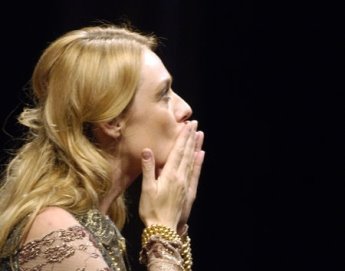Enchanted by Magdalena Kožená
| Available at Amazon: Portrait of the Artist: Enchantment, Magdalena Kožená and various artists (released on May 9, 2006) |
The effect on this listener, at least, is the desire to acquire the rest of her catalogue, especially Lamento and the other Bach discs, her 2004 Songs disc, and her Handel recordings. However, at this price, this compilation is an almost painless way to add two hours of beautiful singing to your collection. The disc is packaged for fans rather than cognoscenti: no song texts or translations, no liner notes, but plenty of attractive pictures of the singer and a worshipful essay by Nick Kimberley, with darling pictures of little Magdalena singing in a children's choir and playing the piano.
 As mezzo-soprano voices go, Kožená has a sound as pretty and luminous as her face, and she is a rather attractive woman: her Web page selection of glamorous photographs must receive a lot of traffic. There is little of the emotional heft and murky opacity of darker-voiced mezzos like Lorraine Hunt Lieberson or Sarah Connolly. This is not to say that her voice has no emotional appeal, but in Erbarme dich from Bach's St. Matthew Passion, for example, she has the same searing, constant tone color as an organ pipe or the vibrato-free purity of the violin from Marek Štryncl's Musica Florea. There are some interesting juxtapositions, most notably an aria from Massenet's Cléopâtre ("J'ai versé le poison"), an opera I would like to get to know, alongside four pieces for Cleopatra from Handel's Giulio Cesare. Kožená has confessed before that she is most comfortable singing 18th-century music with period instrument groups, and I would agree that those tracks are the best ones, her work with Marc Minkowski, in particular.
As mezzo-soprano voices go, Kožená has a sound as pretty and luminous as her face, and she is a rather attractive woman: her Web page selection of glamorous photographs must receive a lot of traffic. There is little of the emotional heft and murky opacity of darker-voiced mezzos like Lorraine Hunt Lieberson or Sarah Connolly. This is not to say that her voice has no emotional appeal, but in Erbarme dich from Bach's St. Matthew Passion, for example, she has the same searing, constant tone color as an organ pipe or the vibrato-free purity of the violin from Marek Štryncl's Musica Florea. There are some interesting juxtapositions, most notably an aria from Massenet's Cléopâtre ("J'ai versé le poison"), an opera I would like to get to know, alongside four pieces for Cleopatra from Handel's Giulio Cesare. Kožená has confessed before that she is most comfortable singing 18th-century music with period instrument groups, and I would agree that those tracks are the best ones, her work with Marc Minkowski, in particular.There are also two nice bonus features, beginning with a little music video on the first CD, an MPG file that can be played on a computer with little trouble (you can view it at YouTube, of course). This short feature, directed by Ondřey Havelka, uses the recorded track of Bach's "Kommt, ihr angefochtnen Sünder" (from the cantata Freue dich, erlöste Schar, BWV 30). The storyline follows a girl (Kožená) who makes a copy of the aria, which she carries with her brother to the organ loft of a Baroque church where Bach is rehearsing the piece. While her brother pretends to sing the aria (he is apparently one of the composer's choristers and pretends to be sick to induce her to sing), she stands behind him and sings. The old composer, who was by reputation a demanding and short-tempered director, is at first annoyed but then is charmed by the sound of Kožená's voice.
In spite of the inevitable inconsistencies of this kind of project -- the organ continuo continues to play even after Bach moves away from the keyboard, the conducting and lip-synching do not line up with the track -- I found the result charming. The scene dissolves and we see Kožená in a library discovering the manuscript of the aria, making a photocopy of it (as someone who uses music archives regularly, please do not do that yourselves!), and sticking the copies in the back pocket of her jeans as she walks away. The other bonus is an extra Dvořák track on the second disc, a folk song that is quite lovely, although not as devastatingly gorgeous as the extraordinary "Dobrú noc, má milá" (Good night, my darling) that precedes it, a three-minute bon-bon that all singers should get a copy of immediately.
Kožená has a new disc of Mozart arias in international release this month (presumably later for North America), with Simon Rattle and the Orchestra of the Age of Enlightenment. Sadly, she will not be joining that group in their Washington appearance this December at the Library of Congress. (Doubly sad because I was not able to go down to Charlottesville this past February, when she sang on the Tuesday Evening Concert Series at the University of Virginia, with Les Violons du Roy.) There are a couple video clips of Kožená singing Mozart, Gluck, and Bach available at YouTube. She will be singing a recital at Lincoln Center (Alice Tully Hall) on November 19, as well as the role of Idamante in the Met's Idomeneo in December, a revival of the Ponnelle production reviewed on DVD at Ionarts recently. She sang that role in the Roger Norrington production at Salzburg this summer, too.





















































No comments:
Post a Comment